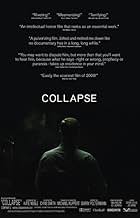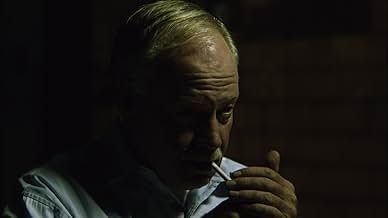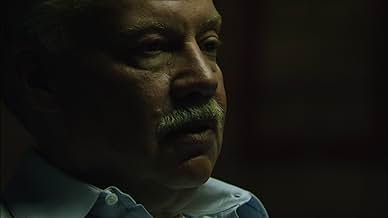Füge eine Handlung in deiner Sprache hinzuA documentary on Michael Ruppert, a police officer turned independent reporter who predicted the current financial crisis in his self-published newsletter, From the Wilderness.A documentary on Michael Ruppert, a police officer turned independent reporter who predicted the current financial crisis in his self-published newsletter, From the Wilderness.A documentary on Michael Ruppert, a police officer turned independent reporter who predicted the current financial crisis in his self-published newsletter, From the Wilderness.
- Regie
- Drehbuch
- Hauptbesetzung
Empfohlene Bewertungen
I would surely say - the most important movie for the 21st century man.
We live in a fairytale where everybody has a hope that the ''good'' will overcome the ''evil'' no matter how bad it is, because it will be better... in the end that's the way fairy tales end, don't they? The ugly truth is that no magical wonderland exists, there is only now and here and this movie shows you WHAT ACTUALLY IS NOW AND HERE.
All of his concerns are true, and some are even worse than he stated, but the very worst problem of all didn't even get a mention from him....that of global overpopulation that is the root cause of all the symptoms of our existence troubles that he did state.
To simplify......if the world's population was 20% of what it is now, the maximum sustainable figure, all of Ruppert's concerns for human existence would not be crucial for thousands more years when real solutions to the problems he stated might be available. But, we cry about the symptoms and don't care one bit about the cause so we continue to overpopulate all countries with uncontrolled new births, and are continually overburdened with resultant and mostly unsolvable problems as a result. Air, water, oil, food, and every single other problem of today that Ruppert stated has been caused by overpopulation, but still we cry only about symptoms, as Ruppert does, instead of the root cause of all our global problems....too many people being born with no controls on it and, what is much worse, no gov't or societal thought even being given to it.
As a result of that typical human stupidity and shortsightedness we are done, people, it is just a matter of time, and not that much time either, as your own young grandchildren will suffer badly as a result. But, still you don't care, so nothing is ever done about it. We don't deserve any more time on earth if we don't even care enough about protecting our continued existence by working on the cause of all of our problems.
I would like to have had more info on a lot of his quotes but I guess that would likely take an 80 minute documentary into like 3 or 4 hours (which I wouldn't have minded). I might just buy some if his books to take a look to see how much more in depth he gets on most of the topics he covers in this documentary.
For me, watching this, it was like it's about time. What I mean by that is finally someone who doesn't come across as a street corner preacher or a bona fide nut. This guy is just talking about real issues that matter, or at least they should matter.
Collapse is an amazing documentary that works on several levels. We'll start with the first: Ruppert's analysis of the world around us is stunningly bleak. Our entire civilization is based on oil. This is fact. All transportation requires oil in some form. All manufacturing (and civilization as we know it) is based on energy, which is finite, and requires some oil in some form. Building the resources to harvest ANY energy source requires manufacturing and transportation, which requires oil. Cultivating food requires energy to produce and transportation to get to your grocery store or home. Even if we discover some new energy source - algae, for example, which is not addressed in the film - all the components needed to harvest or utilize that energy are oil-based. Even if we invent cars without tires (which require 8+ barrels of oil to make, PER TIRE), the plastics and metals and components in those vehicles all require oil as either a direct ingredient or as an indirect part of the manufacturing.
Now imagine a world without oil. See where this is going?
This film, and Ruppert, go much further than that. Oil dependency is just the appetizer. Then we get to Peak Oil (or the Hubbert Peak). Then an economy based on floated, imaginary, (fiat) money. And so on. Ruppert builds his case with hysterically grim anecdotes and considerable authenticity. It's difficult to disagree with him precisely because he doesn't allow 'theory' or partisan/ideological opinion to seep into the discussion. The facts are accurate. The conclusions... are up to you.
Let's talk about the film-making itself: Chris Smith's film is shot 'bunker-style' for effect. It works. There are hardly any miscues in the technical aspects, and the editing style is absolutely riveting and never boring. As pure entertainment, if we can call it that, this film will absolutely command your attention for 80 minutes. The film does not subscribe - one way or another - to Ruppert. It just shows him as he is and allows you to draw your own conclusions. Right or wrong, Ruppert's quest to seek this knowledge and tell it to the world has subtly destroyed him. Collapse works on an intensely personal level, too. This film burns itself into the mind. It's point blank brilliant.
Others have noted a major flaw in Ruppert's arguments, including the filmmaker himself: Ruppert does not allow for miracles or human ingenuity in his apocalyptic scenarios. Ruppert has already decided we've passed the point of no return and is now looking to "build the lifeboat on the Titanic". When confronted about this directly, Ruppert's non-answer more or less says that he won't trust his fellow humans to think a way out of this. Ruppert has so expertly identified the problems, but he has no answers. All his "hope" is directed at ways to survive what's to come. Again, right or wrong, this man absolutely believes what he's saying and is absolutely terrified. You should be, too.
What's the way out? Well, I personally choose to believe the first part of Ruppert's argument and disregard the second. We are in trouble. But I choose to have faith in my fellow man, that we can "fix the Titanic" before it's too late. In the meantime, you must see this film. See it, soak it in, let it shake you, and tell your friends. Draw your own conclusions. Ruppert's role is to sound the warning. Perhaps if enough people see this film, someone out there will figure out what to do.
It seems I need to continue my comment based on IMDb policy of ten lines. That doesn't impress me as necessary, but I see the decision isn't mine. It's a great film, go and watch it. Anyway, hopefully this is enough to satisfy the rules. Why the needless wordiness IMDb? I liked the film and the participant, that isn't enough said? I'll bet many reviews never get posted based on the ambiguous ten lines rule.
Wusstest du schon
- WissenswertesAccording to director, Chris Smith, they initially agreed the primary subject was supposed to be the CIA's connections to drug smuggling within the Iran-Contra affair, specifically Ruppert's collaboration with Pulitzer Prize-winning reporter Gary Webb's mid-1990's investigative series, "Dark Alliance." But Ruppert didn't want to talk about the CIA. Instead, he wanted to talk about peak oil, and its critical implications for the future.
- Zitate
Michael Ruppert: It's kind of sad because we as a species have become so disconnected from the Earth. We don't have any real contact with the Earth. We don't have any sense of its functions, its feeling, its seasons, its timings.
- VerbindungenReferenced in Film Junk Podcast: Episode 235: TIFF Report, Part 1 (2009)
- SoundtracksCollapse
Performed by Karli Larsen, Didier Leplae, Joe Wong
Top-Auswahl
- How long is Collapse?Powered by Alexa
Details
Box Office
- Bruttoertrag in den USA und Kanada
- 46.964 $
- Eröffnungswochenende in den USA und in Kanada
- 7.800 $
- 8. Nov. 2009
- Weltweiter Bruttoertrag
- 46.964 $
- Laufzeit1 Stunde 22 Minuten
- Farbe
Zu dieser Seite beitragen



















